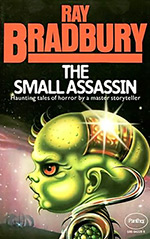
![]() niriop
niriop
1/5/2021
![]()
A stellar collection of Bradbury's horror stories, compiled from his earlier Dark Carnival and The October Country.
"The Small Assassin" is really the reason why I picked this edition up, and it's a real corker. Bleak and violent, as a story about a killer child has to be, I'm suprised it hasn't been more controversial.
"The Next in Line" is a bit more of a disappointment, about a young couple vacationing in Mexico. Overlong, it shows Bradbury's prose at his "stodgiest", although it is ultimately effective as a psychological drama.
"The Lake" is a brief story in the tradition of the likes of James and Benson. Effective, but minor.
"The Crowd" is the second best in the collection, and concerns a man noticing that the same group of people seem to be repeatedly gathering around traffic accidents in his city over and over again...a brilliantly original tale, selected by the VanderMeers for their giant weird fiction sampler anthology.
"Jack-in-the-Box" however is the supreme story here: a boy and his mother live in isolation in a giant house, supposedly surrounded by "monsters", built by the boy's deceased father, whom the mother claims to have been a god. As wonderous as it is disturbing, it is psychological dark fiction (without the need of the supernatural) at its finest.
"The Man Upstairs" is another good one, concerning a young boy battling a bizarre lodger in his grandmother's house.
"The Cistern" is more fanciful, concerning lost love, while "The Tombstone", while minor, is amusing in its twists and turns.
"The Smiling People" is sadly the weakest tale in the collection, as an experienced horror reader can already figure out the "twist" on the first or second page, making reading it a futile exercise.
"The Handler" is a good weird tale of the vengeful undead (with some truly grotesque imagery in a funeral parlour that really gets under your skin), while "Let's Play 'Poison'" is an odd story that makes one recall the fantasies of pupil-teacher revenge one had when in secondary school.
"The Night" is extracted from Bradbury's semi-autobiographical Dandelion Wine. It's a nice snapshot of 1920s Illinois, but would probably read better in its original context.
"The Dead Man" is a bit dull to go out on, but its end twist is still a good one.
All in all, I'd recommend this as an easy introduction to the darker side of Bradbury.